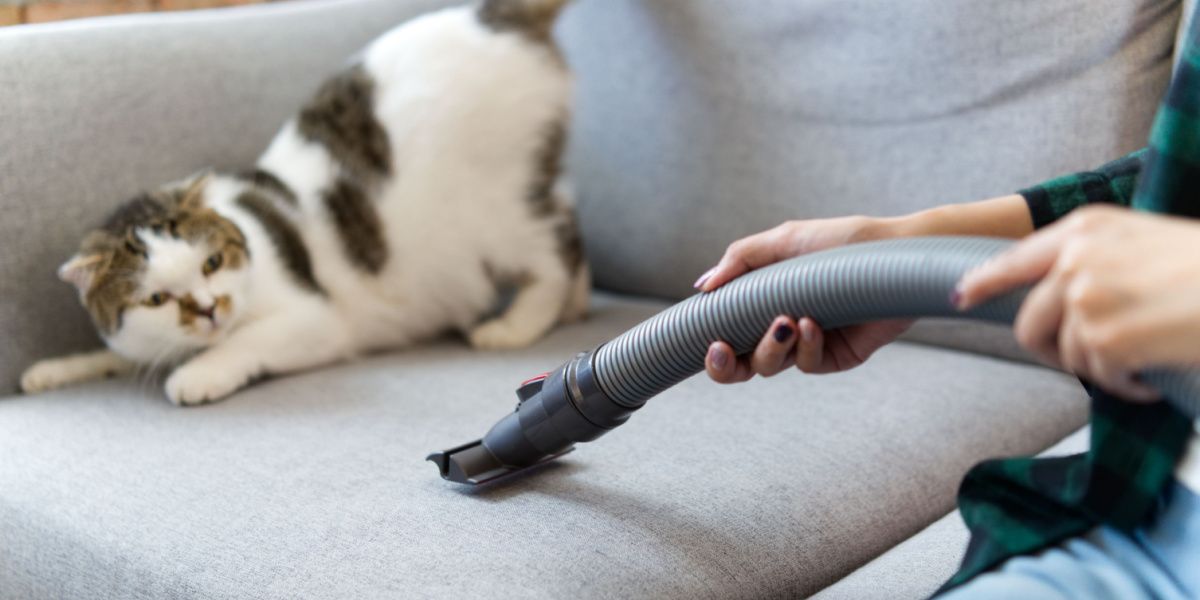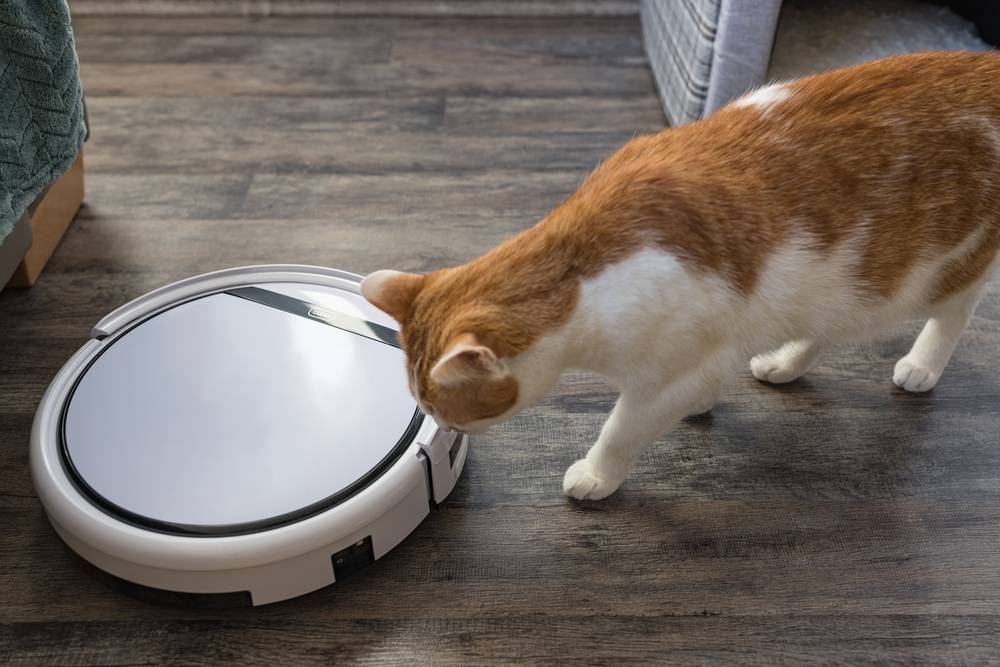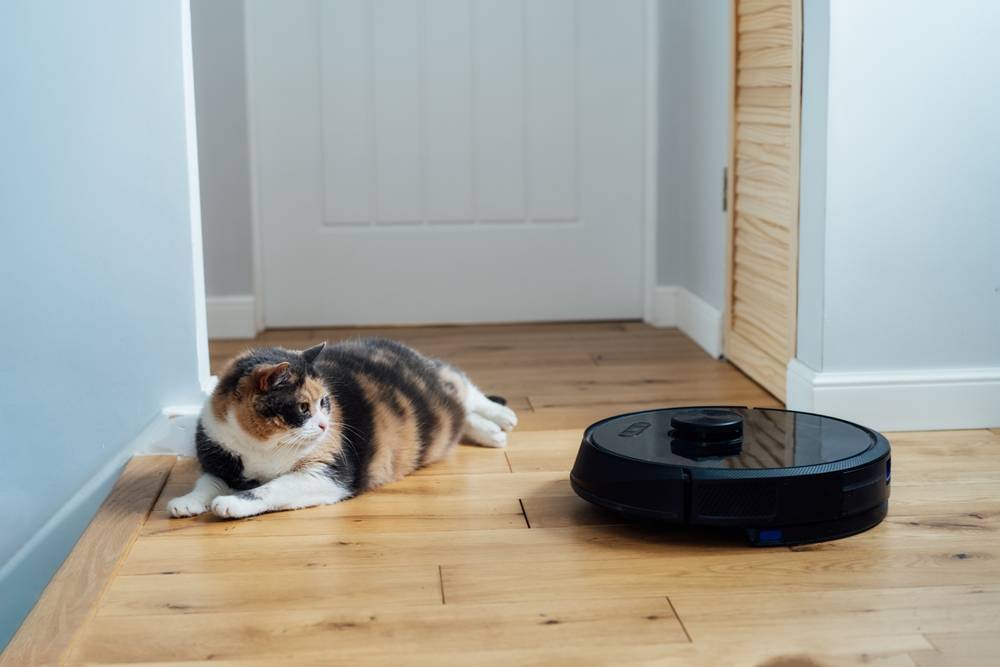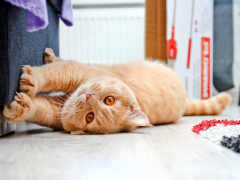
Shutterstock.com
Cats will often scatter when their human gets the vacuum out, but why are cats scared of vacuums? No cat owner wants to cause their feline family members fear, and if your cat finds your normal cleaning routine stressful, you’re probably wracked with guilt.
The combination of loud noise, unpredictable movement, and a strange smell is often overwhelming for cats and causes them anxiety. Of course, you can’t stop cleaning your home altogether, especially with all that pet hair and loose cat litter around the litter box.
In this article, we’ll cover the reasons behind your cat’s dislike of the vacuum cleaner and what you can do to make running the vacuum an easier experience for them.
Key Takeaways
Cats can become overwhelmed by the size, sound, smell, and movements of a vacuum cleaner.
Cats prefer a predictable routine. The occasional introduction of a big, strange, loud machine can be very stressful for them.
By gradually familiarizing your cat with the vacuum and building up their exposure slowly, you can reduce their anxiety.
5 Reasons Why Cats Are Scared of Vacuum Cleaners
If you give it some thought, it’s probably not too surprising that most cats don’t like vacuums. Here are the primary reasons:
1. The Loud Sound
Vacuums are noisy! Some people may even find using the vacuum cleaner overwhelming if they’re feeling anxious or just in need of quiet. Well, cats have far better hearing and are even more sensitive to noise.
That’s why cats are so sensitive to loud noises, like fireworks and thunder. It’s no wonder that your cat wants to find the nearest quiet place to hide from all that racket from the vacuum.
2. The Size
The size of most vacuums is intimidating for cats. After all, compared to a cat, they’re often huge and probably seem like a threat in your cat’s mind. With their survival instinct kicking in, they head for the nearest exit.
3. They’re Unfamiliar
Every household is different in how often they vacuum the floors. However, unless you use the vacuum cleaner multiple times a day, your cat is likely to find its sudden appearance in the room quite stressful. Cats are creatures of habit and they like predictability. A vacuum can turn up unexpectedly, which will cause your cat to feel anxious.
4. The Smell
Have you noticed that your vacuum has an odor? Many vacuum cleaners will smell slightly. This could be the smell of the dust and debris you’ve vacuumed up or perhaps a faint burning smell from the warm plastic.
Or maybe you tend to use fragrances to banish those unpleasant smells. Whether it’s the vacuum smell or the perfumes you use with it, your cat is likely to find it overwhelming.
This goes for other cleaning products too, so it’s best to use those with more subtle fragrances. If you’ve got concerns about pet smells, try our natural ways to reduce unpleasant cat odor.
5. The Movements

Cats don’t realize their owners are controlling the vacuum, making them feel more threatening. Shutterstock.com
Your cat probably doesn’t understand that you are controlling the vacuum. To them, it seems that the machine is moving quite chaotically or even following them around the house, causing them to feel unsafe. This applies even more if you have a robot vacuum because it will feel like even more of a threat to your cat.
What You Can Do To Help Your Cat Feel More at Ease Around the Vacuum
If you want to help reduce your cat’s anxiety when it comes to the vacuum, it’s important to be patient. Kittens are likely to adapt more quickly but adult cats may take longer. The following tips will help you gradually get your cat more comfortable with the vacuum cleaner:
1. Build Up Your Cat’s Exposure
When you start desensitizing your cat to the vacuum, it’s crucial to start small. Put your vacuum in the corner of a room where your cat can see it—without turning it on. Leave it there for a few days or longer if that’s what it takes for your cat to seem more relaxed.
Once your cat is more comfortable, move the vacuum closer to them or to a more imposing position—again without switching it on. Once your cat is comfortable with that, turn the vacuum on briefly when your cat is in a different room.
As time progresses, you should be able to turn the vacuum on for longer and bring it closer, without bothering your cat much.
2. Reward Your Cat for Being Calm
Throughout the process of desensitizing your cat, use positive reinforcement. This means giving them treats, petting them, or verbally praising or soothing them in response to them showing normal, calm behavior.
3. Try a Distraction
During desensitization, as you’re bringing the vacuum closer, distract your cat with a toy, their favorite game, or anything fun. If you can get their attention despite the sensory overload of the vacuum, it means they’re becoming more relaxed.
4. Don’t Rush the Process

By taking slow and gradual steps to desensitize your cat to the vacuum, you can reduce your pet’s stress and anxiety. Shutterstock.com
Change doesn’t happen overnight and it will take some time for your cat to feel comfortable. If you take the steps to desensitization too quickly, you’re unlikely to be successful and could even cause your cat severe stress. Therefore, a patient, gradual, and supportive approach is best.
5. Create a Safe Place
Create an escape route and a place where your cat can go to feel safe and calm. This will help them feel less trapped by the vacuum. Use a closet, blankets around a cat box, or an igloo-style bed to help muffle the sounds. A pheromone or calming diffuser nearby will also help your cat feel more secure.
6. Speak to a Veterinarian
If your cat’s reaction to the vacuum is severe and they show symptoms of stress at other times too, you might need to seek the advice of a veterinarian. Stress can lead to over-grooming, fur loss, skin issues, and urinary problems. It’s not a good idea to ignore any signs.
Your cat’s vet can prescribe calming medications and give you further advice on how to lower their anxiety level. In addition, our article on common cat anxiety medications will help you decide whether this type of treatment is needed.
Frequently Asked Questions
Why do cats hate the sound of the vacuum?
Cats have quite sensitive hearing and vacuum cleaners are really loud. Therefore, it’s no real surprise that cats find the sound of the vacuum scary.
Why are pets scared of vacuums?
Vacuums are a sensory overload. The loud noise, scary sights, and the smell of the vacuum can cause cats and other pets to be afraid.
Do vacuums hurt cats’ ears?
Since cats have excellent hearing, if your vacuum cleaner is quite loud, it’s likely to be overwhelming for your cat's hearing.
Will my cat get used to the vacuum cleaner?
With a patient and gradual approach using positive reinforcement, you can reduce your cat’s anxiety around the vacuum. However, this change doesn’t happen overnight, so it’s important to take things slowly.








I had a cat that learned to turn on the Roomba and would ride it around the living room during the middle of the night.
I don’t believe that my cat will ever “desensitize” to the point of being comfortable with a running vacuum. Not gonna happen and it ain’t the end of the world. Cats are resilient, and once vacuuming is done, they’ve already forgotten about the incident and will move on in their life (or one of their 9 lives).